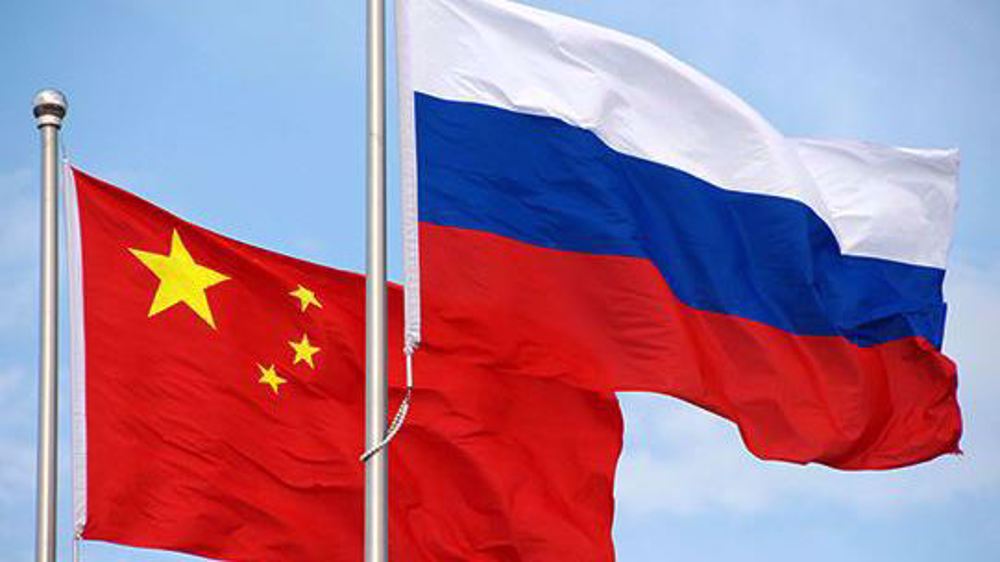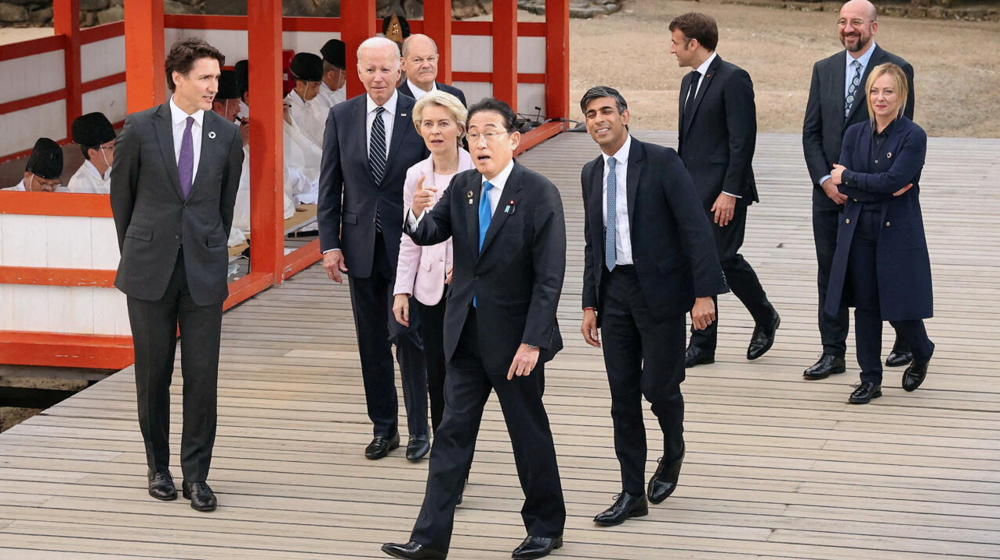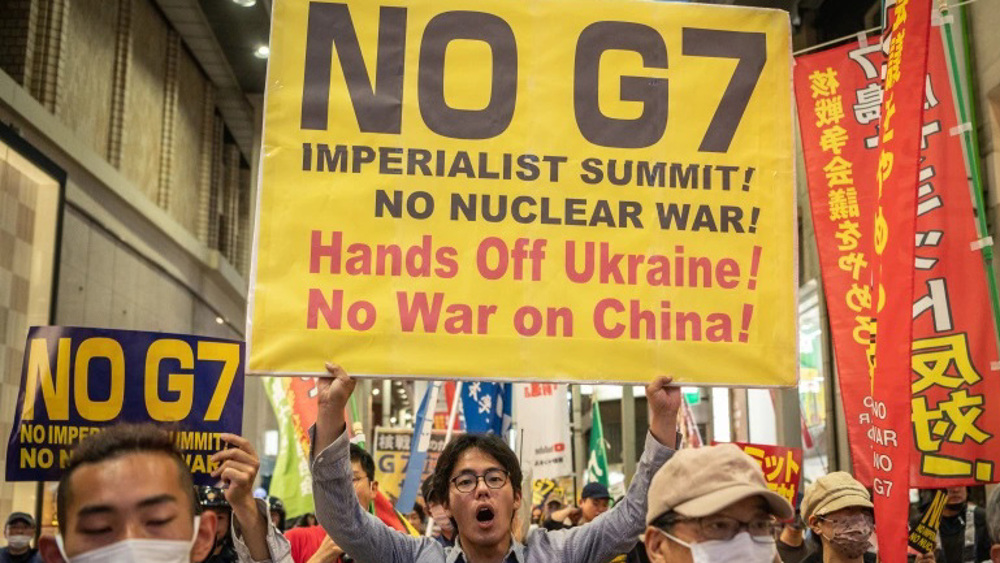Russia, China express 'strong dissatisfaction' with G7 communique
Russia and China have expressed "strong dissatisfaction" with the final statement issued at the end of the Group of Seven (G7) summit in the Japanese city of Hiroshima, a city that was destroyed by the US atomic bombing in 1945.
In a joint statement on Friday, which was revised on Saturday, the G7 -- consisting of the United States, Japan, Germany, Britain, France, Canada and Italy -- targeted both Russia and China with threats and disparaging remarks.
Russian Foreign Minister Sergei Lavrov said on Saturday that decisions taken at the G7 summit were aimed at the "double containment" of Russia and China.
Lavrov, in a televised conference, reiterated Moscow's viewpoint that the West is using Ukraine as a tool to inflict a strategic defeat on Russia.
"The task was set loudly and openly - to defeat Russia on the battlefield, but not to stop there, but to eliminate it as a geopolitical competitor," Lavrov noted.
"Look at the decisions that are being discussed and adopted today in Hiroshima at G7 summit of the Seven, and which are aimed at the double containment of Russia and China," Russia's top diplomat stated.
Lavrov said Moscow enjoyed the support of its many allies and Russia will weather the hardships despite the West's efforts to put pressure on countries to cut trade and economic ties with the Russian nation.
Russian President Vladimir Putin said on Friday that the West was trying to break Russia up into dozens of different states.
The US-led West is driving a wedge between different ethnic and national groups in Russia and breaking the country up into dozens of different states, Putin warned.
Beijing, in a similar approach, showed its strong disapproval of the G7 for smearing and attacking the Chinese nation.
The Chinese Foreign Ministry said on Saturday that it has lodged stern representations to the G7 summit's host, Japan, and other relevant parties after the group criticized Chinese policies in regard to Hong Kong, Xinjiang and Tibet.
The group advocates "promoting a peaceful, stable and prosperous world," but what it does is hinder international peace, undermine regional stability and curb other countries' development, the statement said, adding that it simply shows how little international credibility means to the G7.
The Chinese Foreign Ministry's statement pointed out that Taiwan is China's Taiwan and resolving the question is a matter for the Chinese. It reiterated that the one-China principle is the solid anchor for peace and stability across the Taiwan Strait.
Despite emphasizing on cross-Strait peace, G7 said nothing about the need to oppose "Taiwan independence," which in effect constitutes connivance and support for "Taiwan independence" forces, and will only result in a serious impact on cross-Straits peace and stability, according to the statement.
The Chinese statement said no one should underestimate the determination, resolve and capability of the Chinese people in safeguarding China's sovereignty and territorial integrity.
The issues related to Hong Kong, Xinjiang and Tibet are purely China's internal affairs and China firmly opposes interference by any external force in those affairs under the pretext of human rights, the statement noted.
It urged the G7 to stop pointing fingers at China on Hong Kong, Xinjiang and Tibet and take a hard look at their own history and human rights record.
The statement reminded the G7 nations that the East China Sea and the South China Sea have remained overall stable, and it called for other countries to respect the regional countries' efforts to uphold peace and stability and stop using maritime issues to drive a wedge between regional countries and incite bloc confrontation.
The statement also noted that the massive unilateral sanctions slapped by the United States and acts of decoupling and disrupting industrial and supply chains make the US the real coercer that politicizes and weaponizes economic and trade relations. It urged the G7 not to become an accomplice in the Americans' economic coercion.
China is the only nation among the five nuclear weapon states that pledged "no first use" of nuclear weapons and always kept its nuclear capabilities at the minimum level required by national security, the statement noted, adding that China's position on the matter should not be distorted or denigrated.
As a responsible major country, China firmly upholds the UN-centered international system, the international order underpinned by international law and the basic norms governing international relations built around the purposes and principles of the UN Charter, it said, adding that the Chinese nation will never give in to the so-called rules imposed by the few.
"The international community does not and will not accept the G7-dominated Western rules that seek to divide the world based on ideologies and values, still less will it succumb to the rules of exclusive small blocs designed to serve 'America-first' and the vested interests of the few," the statement said.
The Chinese Foreign Ministry urged the G7 to stop engaging in closed and exclusive "small circles," stop containing and suppressing other countries, stop creating and provoking confrontation and return to the right path of dialogue and cooperation.
Dec. 21: ‘Axis of Resistance’ operations against Israeli occupation
Spain jurists demand ties with Israel ties be cut
VIDEO | Press TV's news headlines
VIDEO | Iran honors top Science Olympiad medalists
VIDEO | Austrians arrested at Gaza protest in Vienna
10 killed in bus crash in western Iran
VIDEO | One-man-band journalism with Civili
5 Israeli forces killed as Palestinian fighters face up to regime’s war machine












 This makes it easy to access the Press TV website
This makes it easy to access the Press TV website